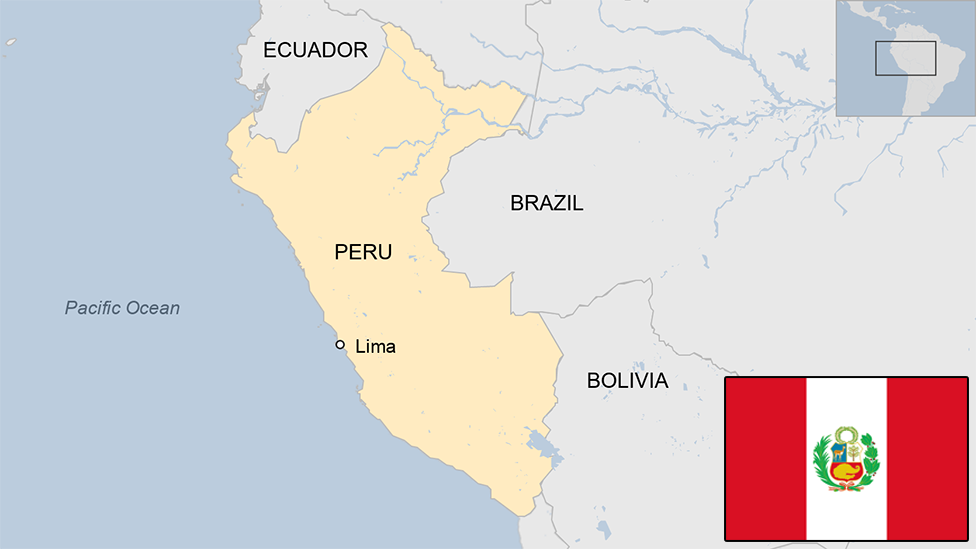Peru election: The end of Fujimorismo?
- Published
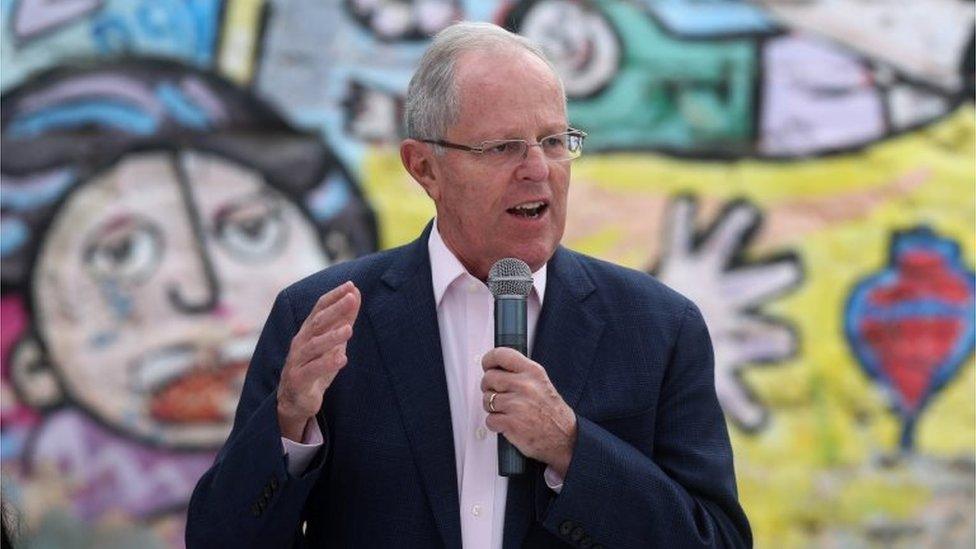
Pedro Pablo Kuczynski ran on a promise to revive Peru's economy
He is the British- and US-educated son of European immigrants with a foreign surname that most Peruvians struggle to pronounce.
But Pedro Pablo Kuczynski is set to become Peru's next president after winning a desperately close run-off against his bitter rival, Keiko Fujimori.
Mr Kuczynski clinched 50.1% of the votes, beating his opponent by a razor-thin margin.
Peruvians spent several days waiting for an official result from the election authorities, the slim gap between the candidates hovering around a mere 50,000 votes.
A week before election day, Keiko Fujimori was riding high with a six-point lead over the former minister, who is best known to Peruvians simply by his initials: PPK.
But just days before the polls opened, thousands of people marched through the centre of the capital, Lima, to protest against Ms Fujimori's candidacy.
In the shadow of her father
She is a divisive figure in a country that is still grappling with her father's controversial legacy.
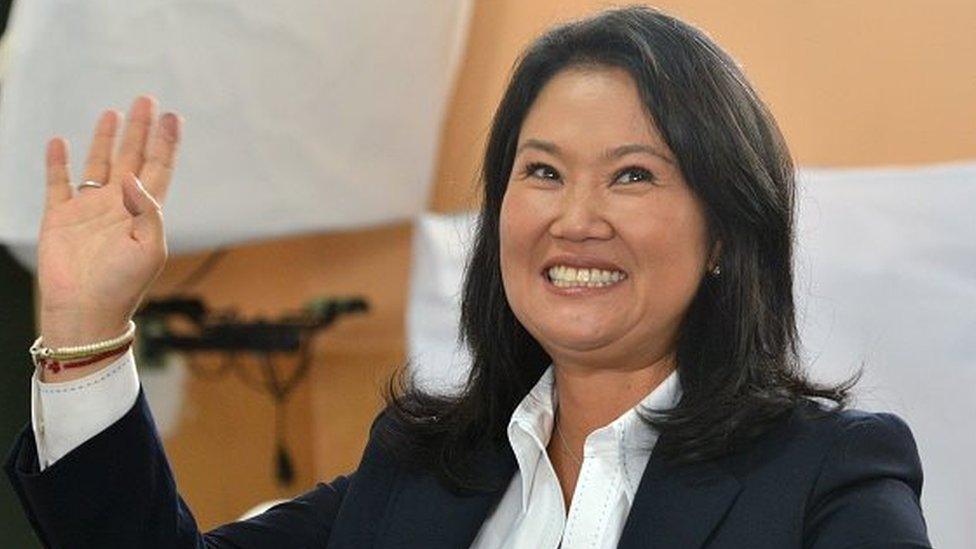
Keiko Fujimori is the daughter of Alberto Fujimori, who governed Peru from 1990 to 2000
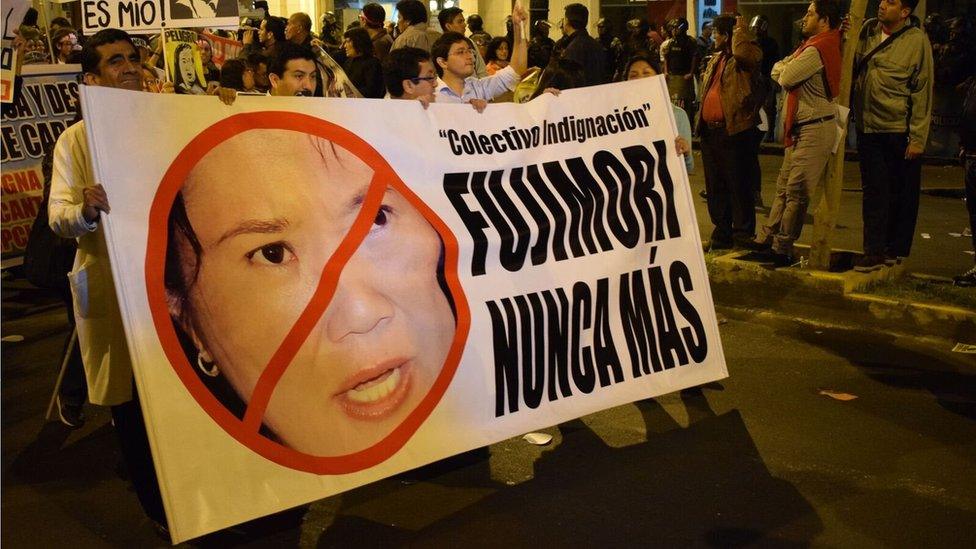
Peruvians opposed to Keiko Fujimori took to the streets in protest in the run-up to the election
"We are here to stop Fujimori from repeating the corruption and crimes of her father," said Roxana, 55, a university lecturer who attended the march.
Ms Fujimori's father, Alberto Fujimori, was president of Peru for 10 years in the 1990s.
After fleeing to Japan and sending his resignation by fax in 2000, he is currently serving a 25-year sentence in a Peruvian prison for human rights abuses.
But many in the country also revere him as the leader who defeated the notorious Maoist insurgent group, Sendero Luminoso (Shining Path), in the 1990s. He is also credited with kick-starting the revival of the country's struggling economy.
Out of touch?
Despite her controversial father, Ms Fujimori had been the frontrunner for much of the race.
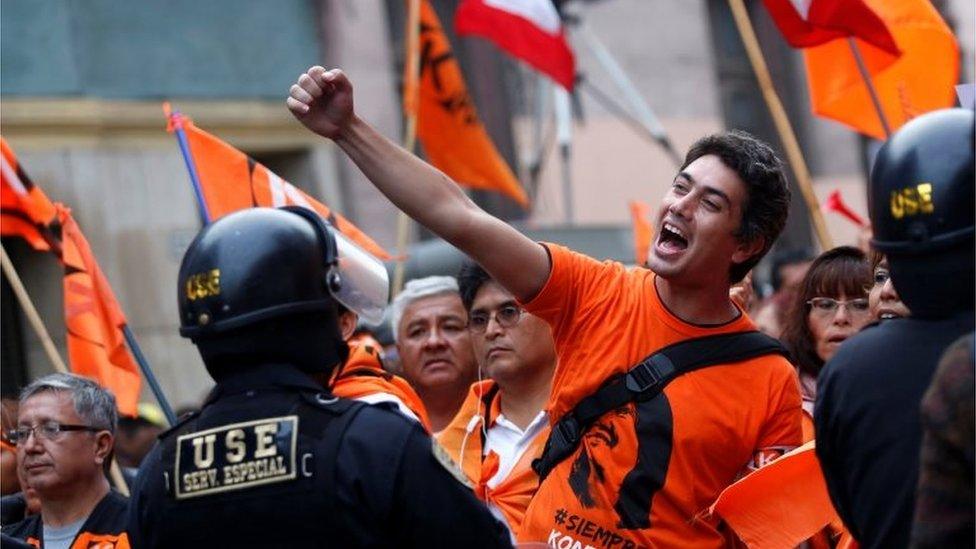
Keiko Fujimori had a comfortable lead in the polls in the run-up to the elections
Her tough stance on crime and tireless campaigning in rural areas attracted both committed fujimoristas, as supporters of her and her father are known, and new voters to her Fuerza Popular (Popular Force) party.
In contrast, with his foreign surname and background as a World Bank executive, many people see Mr Kuczynski as being out of touch with ordinary Peruvians.
"He is perceived as too old, too white and too connected to economic elites," said Steven Levitsky, a Peru expert and Professor of Government at Harvard University.
A heavily criticised trip to the United States after the first round of voting only added to this image.
But a chaotic final few weeks for Ms Fujimori's campaign sparked a dramatic comeback for the 77-year-old, who held dual Peruvian and US citizenship before giving up the latter in 2015.
Scandals
First, Joaquin Ramirez, a senior figure in Ms Fujimori's team was forced to step down after allegations emerged linking him to drug trafficking.
Then her running mate, vice presidential candidate Jose Chlimper, was accused of handing doctored audio tapes aimed at clearing Mr Ramirez to the media.
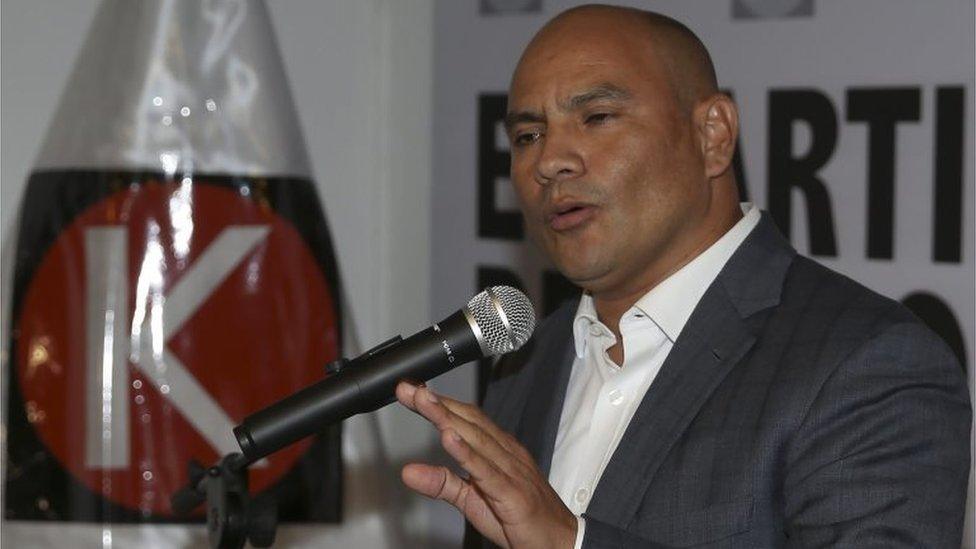
The General Secretary of the Popular Force party, Joaquin Ramirez, is under investigation by the US Drug Enforcement Administration
"The Fujimori campaign was hit by a series of very destructive events in the final days of this election. These undermined five years of her efforts to try to create a new image for her party. For so many Peruvians, this smacked of exactly the kind of manipulative behaviour that occurred on a daily basis under her father," said Prof Levitsky.
For many Kuczynski voters, the former economist was the only alternative to a second President Fujimori in 30 years.
"I had no option but to vote for Kuczynski. The Fujimori family has a dark past. This election was a choice between democracy and authoritarianism," said 69-year-old taxi driver Victor Rios.
Such allegations about key members of Fujimori's team seem to have ruined her attempts to distance herself from her father's legacy.
"This country realised that we can't endorse a president who was going to be surrounded by people implicated in corruption," said Gonzalo Cordova, 35, a member of a local anti-Fujimori activist group.
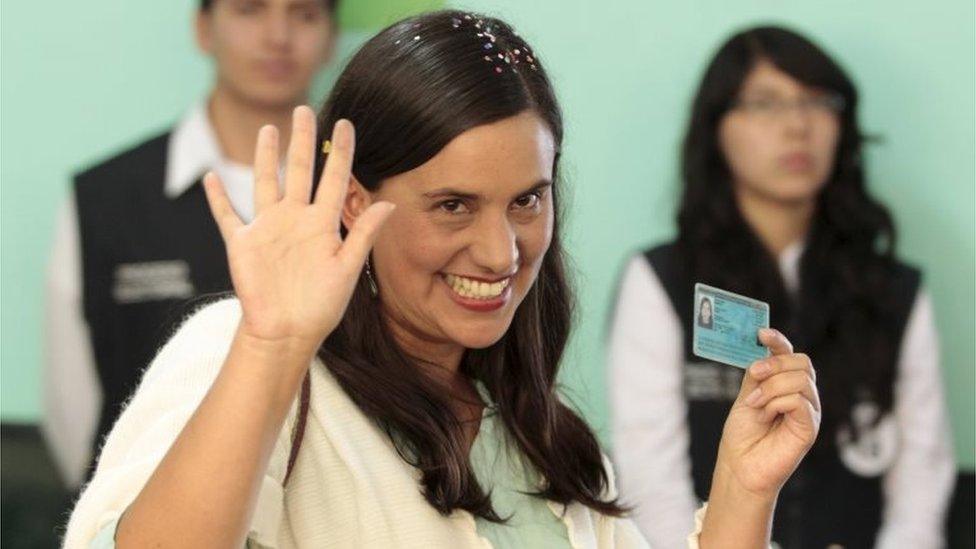
Third-placed candidate Veronika Mendoza said she would back Pedro Pablo Kuczynski
As the momentum started to shift towards Mr Kuczynski, Veronika Mendoza also threw her support behind PPK.
Ms Mendoza, a left-wing presidential candidate for the Frente Amplio (Broad Front), came third in the first round of the election.
"To stop the advance of fujimorismo, the only option is to vote for Kuczynski," she announced just days before the election.
Uphill struggle
Despite his narrow victory in the presidential race, Mr Kuczynski is not yet done battling fujimorismo.
In legislative elections held in April, Ms Fujimori's Popular Force party won 73 out of 130 seats in Peru's Congress.
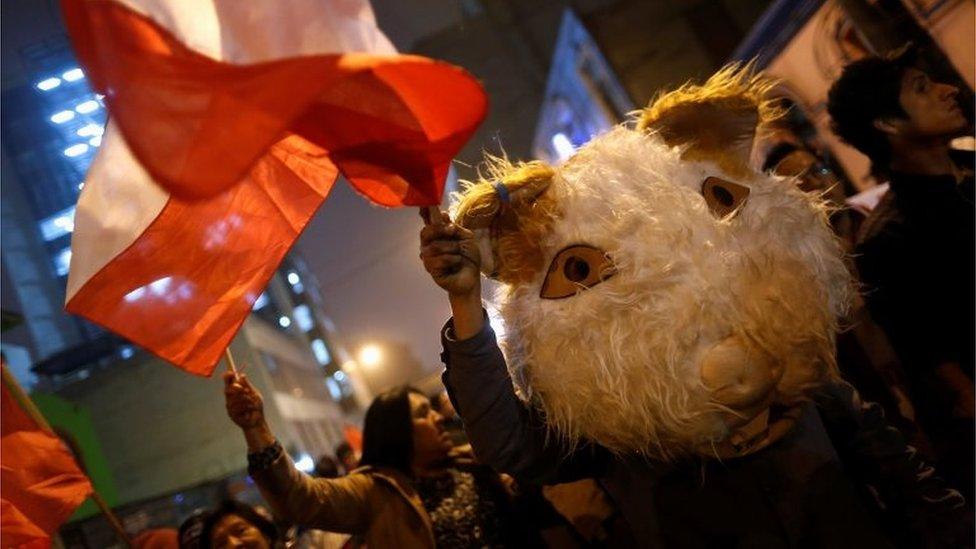
The party of Pedro Pablo Kuczynski, the mascot of which is a guinea pig, only holds 18 seats in Congress
Mr Kuczynski's party only holds 18 seats.
There are also many Peruvians who are disappointed by Ms Fujimori's defeat.
"I voted for Keiko because she was going to be tough on crime. I feel defrauded by this result. It's the same politics as always," said Luz Rojas, 52, a food stall owner in Lima's San Borja neighbourhood.
While Mr Kuczynski campaigned on a platform of change - even his party is called Peruvians for Change - analysts say his centre-right fiscal policies differ little from those of his rival.
The greatest challenge for Peru's new president could well be the battle to win over a public that has grown increasingly disillusioned with politics in general.
Even among the thousands of people who took to the streets to protests against fujimorismo, there seemed to be a certain sense of despondency.
When asked about the current state of their country's politics, some simply shrugged their shoulders and said: "Es lo que hay (It is what it is)."
- Published4 June 2016
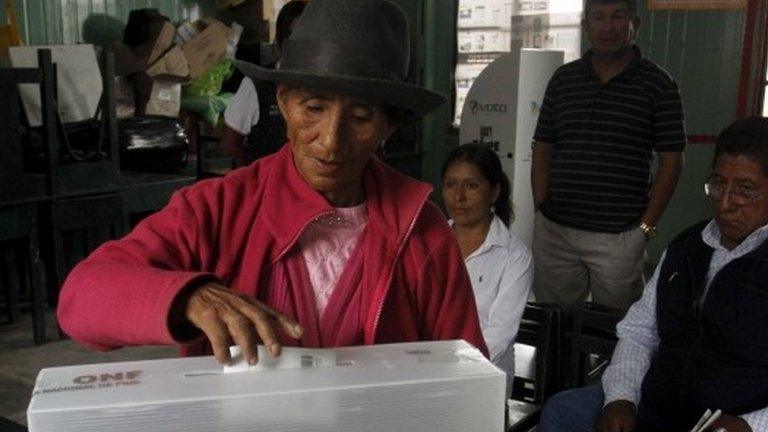
- Published4 September 2023
